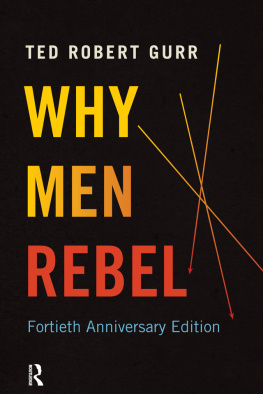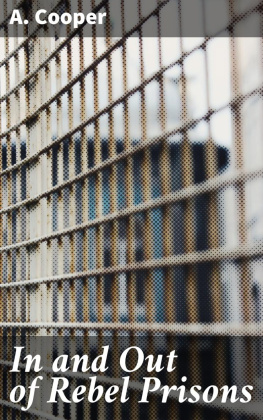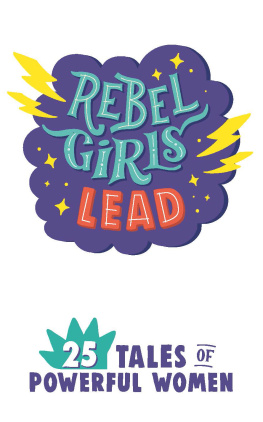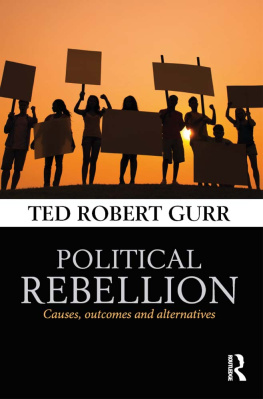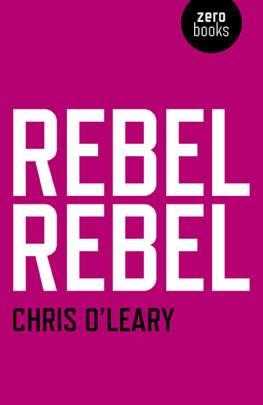Gurr - Why Men Rebel
Here you can read online Gurr - Why Men Rebel full text of the book (entire story) in english for free. Download pdf and epub, get meaning, cover and reviews about this ebook. City: London, year: 2016, publisher: Routledge, Taylor & Francis Group, genre: Politics. Description of the work, (preface) as well as reviews are available. Best literature library LitArk.com created for fans of good reading and offers a wide selection of genres:
Romance novel
Science fiction
Adventure
Detective
Science
History
Home and family
Prose
Art
Politics
Computer
Non-fiction
Religion
Business
Children
Humor
Choose a favorite category and find really read worthwhile books. Enjoy immersion in the world of imagination, feel the emotions of the characters or learn something new for yourself, make an fascinating discovery.
- Book:Why Men Rebel
- Author:
- Publisher:Routledge, Taylor & Francis Group
- Genre:
- Year:2016
- City:London
- Rating:4 / 5
- Favourites:Add to favourites
- Your mark:
- 80
- 1
- 2
- 3
- 4
- 5
Why Men Rebel: summary, description and annotation
We offer to read an annotation, description, summary or preface (depends on what the author of the book "Why Men Rebel" wrote himself). If you haven't found the necessary information about the book — write in the comments, we will try to find it.
Why Men Rebel — read online for free the complete book (whole text) full work
Below is the text of the book, divided by pages. System saving the place of the last page read, allows you to conveniently read the book "Why Men Rebel" online for free, without having to search again every time where you left off. Put a bookmark, and you can go to the page where you finished reading at any time.
Font size:
Interval:
Bookmark:

WHY MEN REBEL
Ted Robert Gurr
Fortieth Anniversary Paperback Edition

First published 2011
by Paradigm Publishers
Published 2016
by Routledge 2 Park Square, Milton Park, Abingdon, Oxon OX14 4RN
711 Third Avenue, New York, NY 10017, USA
Routledge is an imprint of the Taylor & Francis Group, an informa business
Copyright 2011, Taylor & Francis.
The original hardcover edition of Why Men Rebel was published by Princeton University Press 1970.
The original paperback edition was published by Princeton University Press 1971.
The Fortieth Anniversary hardcover edition was published by Taylor & Francis 2010.
All rights reserved. No part of this book may be reprinted or reproduced or utilised in any form or by any electronic, mechanical, or other means, now known or hereafter invented, including photocopying and recording, or in any information storage or retrieval system, without permission in writing from the publishers.
Notice:
Product or corporate names may be trademarks or registered trademarks, and are used only for identification and explanation without intent to infringe.
Library of Congress Cataloging-in-Publication Data for this book is available from the Library of Congress
ISBN 13: 978-1-59451-913-0 (hbk)
ISBN 13: 978-1-59451-914-7 (pbk)
Designed and Typeset in New Celedonia by Straight Creek Bookmakers.
To my daughters Lisa Anne and Andrea Mariel
and the next generation
Jonathan and Natalia Gurr-Lavan
and Alysa Anne Gribben
Why Men Rebel was written in the late 1960s when observers in the Western world were deeply concerned about political violence in postcolonial states, especially in Africa and Southeast Asia, and mass protest movements, especially against racial discrimination in the United States and military intervention in Vietnam. Looking backward, the question is how well its arguments help us understand later waves of violent conflict within societies. This introduction reviews and updates some of Why Men Rebel' s arguments and, in a concluding section, applies it to the wave of pro-democracy protests that swept through the Middle East from 2009 in Iran to 2011 in Tunisia, Egypt, Libya, Yemen, and beyond.
Why Men Rebel was first published in 1970 by Princeton University Press and was awarded the American Political Science Association's Woodrow Wilson Award as the best book of 1970 in political science and international relations. In the next few years it was translated into German, Spanish, and Thai. In the first decade of the twenty-first century it attracted a new Hurry of intellectual interest that led to the appearance of editions in Arabic and Russian.
In my late twenties, when the Why Men Rebel arguments were first formulated in a New York University dissertation, I thought it was possible to provide a general explanation for political protest and rebellion that could help readers understand not only the violent conflicts of the 1960s but a great many others as well.
The essential argument of the Why Men Rebel model is that to understand protest and rebellion in general, and in specific instances, we should analyze three general factors. First is popular discontent (relative deprivation), along with an analysis of its sources. Second are people's justifications or beliefs about the justifiability and utility of political action. Third is the balance between discontented peoples capacity to actthat is, the ways in which they are organizedand the government's capacity to repress or channel their anger. In the present era, people almost everywhere worry about international terrorism, instability in Africa and the Islamic world, and the risks that political conflict will lead to genocidal massacres of dissidents. Does an analytic framework from 1970 also apply in the second decade of the twenty-first century?
The Why Men Rebel model has been tested by many researchers during the last forty years, including its author.political protest or rebellion. Detailed case studies have applied the model, and modified it, to explain particular events such as the Hungarian revolution of 1957 and the Tiananmen Square uprising in China in 1989. In the 1990s, Stephen G. Brush, a historian of science, analyzed several hundred publications in die social sciences that addressed the scientific agenda laid out in Why Men Rebel and published his findings in 1996 in die Journal of Conflict Resolution. This is his summary:
The extent to which theories in the social sciences are accepted or rejected on the basis of empirical tests can be shown only by a detailed analysis of specific cases. [This study] examines die reception in the 1970s and early 1980s of T. R. Gurr's theory of collective violence based on die concept of relative deprivation. The history of this theory may be considered an example of definite progress in social science: A hypothesis widely accepted at one time has been tested and rejected, thus making room for the development of alternative hypotheses. But although Gurr and other advocates of die theory have abandoned it in its original form following the mostly negative results of empirical tests, many social scientists (especially psychologists) have continued to cite it favorably. Slightly less than half of the unfavorable citations have been supported by references to empirical evidence.
He points out that less than half of the unfavorable citations were supported by references to empirical evidencein other words, negative judgments had other bases, such as a preference for different approaches to explanation. Brush adds that a shift toward more favorable citations in the American social science literature was evident by the early 1990s.
The argument prompted strong theoretical critiques. Prominent scholars such as Charles Tilly, Theda Skocpol, and Sidney Tarrow argued that we should begin explanations by examining social and political structures (Skocpol), political mobilization (Tilly), and mass social movements (Tarrow). Mark Irving Lichbach showed that the anger-grievance-rebellion sequence could be explained within a rational choice framework. In light of forty years of research and reflection, I think the core of the Why Men Rebel model remains valid but is incomplete.
First, I continue to think that people, with all their diverse identities, desires, and beliefs, should be central to our analyses of conflict. This means using individuals as the prism through which to examine the effects of social structures, beliefs, and the possibilities for mobilization and political action. Is "relative deprivation" the best concept for doing so? In my own later research, I have used the words grievances and sense of injustice to capture tile essence of the state of mind that motivates people to political action. Whichever phrase is used, the essential first step in analysis is to understand what people's grievances are and where they come from.
This brings me to my second point, which is that to understand grievances, we must first examine where people stand in society and what goods and bads they experience from governments. It is not enough to point to big economic and social structures as the "explanation." We need to understand how people interpret the situations in which they find themselves. Protestors against the effects of globalization, for example, are mainly young people in advanced industrial societies who, objectively, benefit from globalization. Why do they protest, and not the poor of the global South? Some young men in the Islamic world are attracted to militant movements like the Taliban in Afghanistan and al-Qaeda in the Maghreb and elsewhere in the Middle East that justify political violence by appealing to a perversion of Islamic doctrine. Some seek opportunities in the modern world in cities, in the Gulf States, and in Europe and North America. And tens of thousands of young people have led a virtual tsunami of protests against autocratic rulers in North Africa and the Middle East. Why do they respond in such different ways to political appeals and opportunities?
Font size:
Interval:
Bookmark:
Similar books «Why Men Rebel»
Look at similar books to Why Men Rebel. We have selected literature similar in name and meaning in the hope of providing readers with more options to find new, interesting, not yet read works.
Discussion, reviews of the book Why Men Rebel and just readers' own opinions. Leave your comments, write what you think about the work, its meaning or the main characters. Specify what exactly you liked and what you didn't like, and why you think so.

